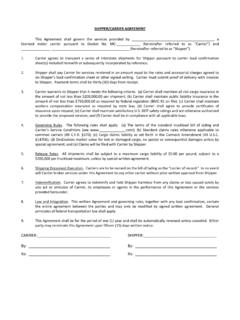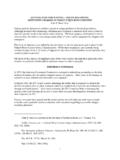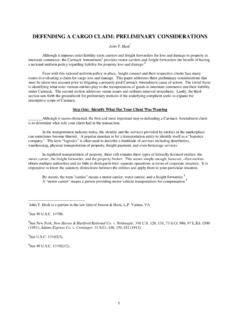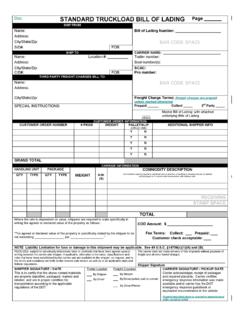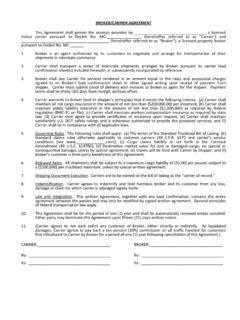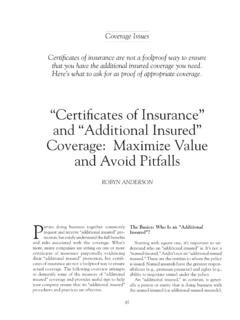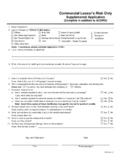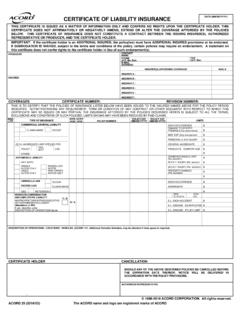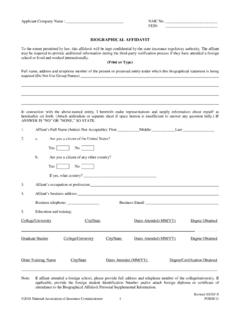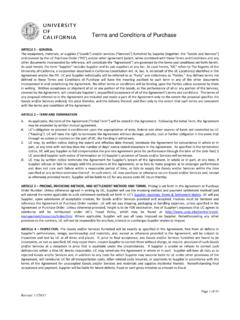Transcription of To Be or Not to Be Additional Insured-Webinar 4-27 RT(FINAL)
1 To Be or Not to Be An Additional insured or Certificate Holder Henry E. Seaton, Esq. Seaton & Husk, 2240 Gallows Road, Vienna, VA 22182. 703-573-0700. 1. Caveat An insurance policy is a written bilateral contract between an insurer and the policyholder (the named insured ). Shippers and brokers seek Certificate Holder and Additional insured status for two reasons. To obtain assurance of a carrier's ability to meet its legal obligations; and To receive notice of cancellation; andt As a risk transfer device, to obtain the benefits of the carrier's coverage for the negligent acts or omissions of others. Generally speaking, a shipper or broker should make no assumption about the coverage afforded to them based upon a Certificate of insurance or evidence of Additional insured status alone without further verification.
2 2. Definitions 3. Certificate of insurance Issued by broker or agent on an Acord Certificate . Evidence only that a policy was issued to the named insured at the effective date of the certificate. Does not identify exclusions or restrictions in the policy or warrant coverage. Agent agrees to endeavor to notify certificate holder of cancellations. Gives certificate holder no enforceable rights. Is some evidence of certificate holder's due diligence . Certificate of insurance is not a contract and does not convey any access to coverage to the certificate holder. 4. Additional insured Status AI Status is often required by entities when the named insured has agreed to indemnify that party in a contract. Naming the indemnitee as an Additional insured reinforces the risk transfer by providing the Additional insured with direct rights against the named insured 's policy.
3 Additional insured is given rights under the insured policy by the Additional insured endorsement. Extends some protection to the Additional insured under the terms and conditions of the named insured 's policy. Additional insured is provided with Notice of Cancellation by the underwriter (obvious benefit). 5. Additional insured coverage is often tied to liability arising out of the operations performed by or on behalf of the named insured . (under current ISO language is caused in whole or in part - broad). Unless affirmative endorsement is issued broadening coverage of the policy, the Additional insured stands in the shoes of the policyholder with respect to coverage afforded, accepting all limitations, exclusions and provisions of the underlying policy AND the endorsement.
4 Additional insured must share one policy limit with policyholder. A major coverage issue is whether Additional insured is merely seeking indemnification for policyholder's obligations to it or whether Additional insured is seeking general liability coverage for its own negligent actions. The scope of coverage afforded can only be determined by examining the policy and the specific endorsement! In some policies, Additional insured status will void the insurance . 6. 1. Named insured bought and paid for the policy. 2. Automatic Insureds are those persons falling within the definition of an insured in the policy, , employees of a corporation, Named insured . 3. Additional Insureds entities added to the definition of an insured by a special endorsement defining extent of coverage.
5 4. Additonal Named insured is ambiguous and DANGEROUS: 1. Another Named insured co-equal coverage with Named insured , usually only given to affiliates or owners of the Named insured and never to outsiders. 2. An Additional insured . 7. Automatic insured Employees of insured corporation in scope of employement. Coverage duties owed to third parties (shippers or brokers) under the policy without either a formal certificate of insurance or Additional insured status. Subparagraph e. of ISO Truck insurance Forms makes shippers and brokers automatic insured parties in BI and PD policies. 8. Sec provides: 1. Who are Insureds ? e. Anyone liable for the conduct of an insured described [in the policy] but only to the extent of that liability.
6 (vicarious liability for the named insured 's acts). This makes Additional insured status not a major benefit coverage issue for the negligent acts (crashes) of the motor carrier. 9. Additional Named insured Two interpretations: Additional Named insured or Additional insured .. A Named insured Extends coverage of the policy to all operations of the named insured without nexus to work performed for it by policyholder. Not relevant where parties are unaffiliated. 10. Loss Payee Status For a lessor or provider of the equipment to the Named insured who insures the equipment for first party property damage without regard to fault; usually never on a liability policy. Motor Truck Cargo Liability Policy - policies sold to motor carriers affording specified coverage for loss, damage or delay to the property of others while in their care, custody and control in transit.
7 This coverage is otherwise excluded from other forms of liability insurance . (Not to be confused with first party goods in transit insurance used in sales transactions, contracts under the UCC Sales 2-320 or 2-321. which insurance specifically describes the goods insured .). Worker's Compensation insurance coverage mandated by state law requiring employers to provide financial surety that employees' claims for injury on the job will be paid pursuant to schedule of benefits provided by statute. 11. Best Practices: What evidence of insurance is typically required? Under traditional principles of federal transportation law: Shippers and brokers are customers of carriers, carriers are vendors. Federal statutes and requirements that carriers be fit, willing and able affording shippers and brokers all of the financial assurance and liability insurance required.
8 12. Auto Liability/Vicarious Liability Motor carriers required to have a minimum of $750,000 per occurrence in BI/PD insurance . 49. 379. Insurer is required to post broad endorsement/filing to pay all judgments for which carrier is legally liable without exclusion, guaranteeing that $750,000 per occurrence minimum would be paid. MCS-90/BMC-91. Shipper and broker traditionally had no liability for accidents assupply chain / shippers and they could rely upon BMC-91X in carrier selection 13. Cargo Liability All carriers were legally liable for claims under Carmack Amendment ( full actual value ). Regulated carriers were required to file Form BMC-32. Cargo insurer liable for full legal liability subject to $5000 per loss and $10,000 aggregate.
9 FMCSA website afforded proof of insurance with no coverage loophole, at least for first $5,000 of coverage. 14. CGL and WC coverage As customers, neither shippers nor brokers had potential liability for worker's compensation claims, so proof of same was not typically required. General liability insurance was not deemed required because Auto Liability (BI and PD) and cargo insurance covered virtually all of the potential risks associated with transportation. NOTE: Some Exclusions from general liability include: All liability arising out of use of a motor vehicle Liability due to an employee's injury (worker's comp). Liability for damage to cargo Some Exclusions from BI and PD include: Damage to cargo and injury to employee of insured 15.
10 Post-Deregulation Written bilateral? contracts began trumping general principles of federal transportation law. Transportation departments of major shippers eliminated and contracting for transportation turned over to procurement department. Shippers began dictating contract terms, treating brokers and carriers as garden variety service providers . The result: Shipper imposed contractual indemnity and Additional insurance requirements. Because of cargo insurance problems, shippers began offsetting cargo claims against freight charges. Cargo claims/Offset/Indemnity The Spiral of Death for small carriers with poor insurance . 16. Post Deregulation Standard Practices Standard evidence of broker due diligence, if there is any standard, appears to be as follows: A Certificate of insurance should be obtained on the sample Acord form showing the broker as the certificate holder with the following limits: General Liability - $1,000,000 per occurrence Auto Liability - $1,000,000 CSL per occurrence Cargo Liability Broad Form, Not Specified Peril - $100,000 per occurrence Worker's Compensation as required by state law 17.
